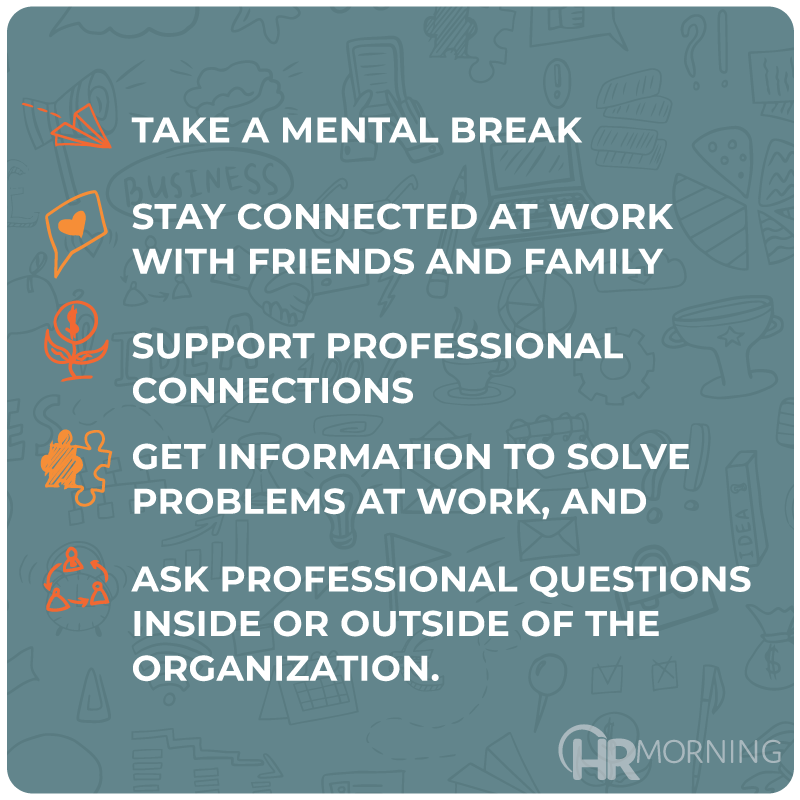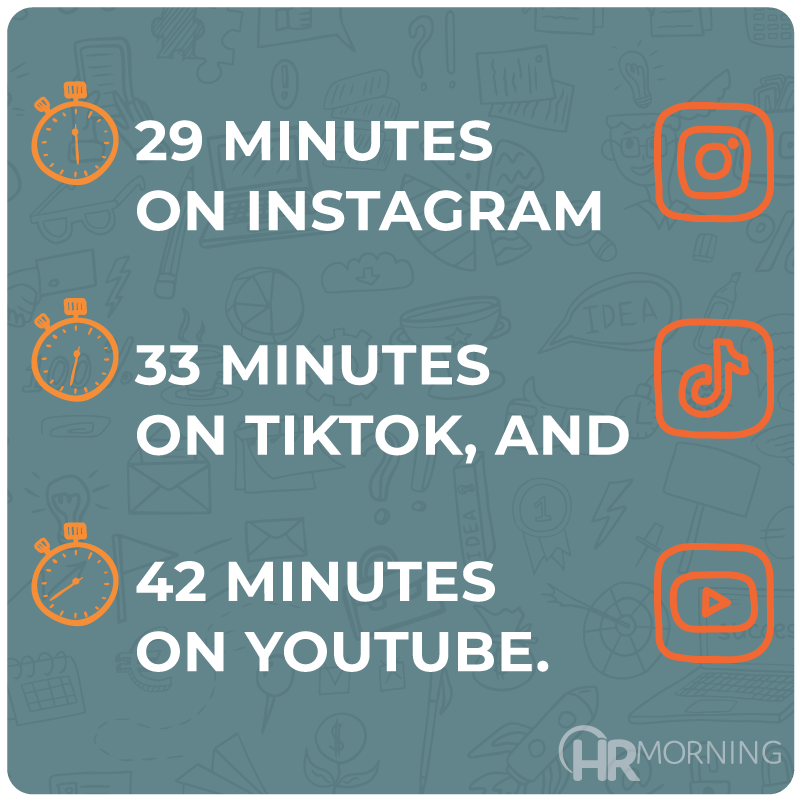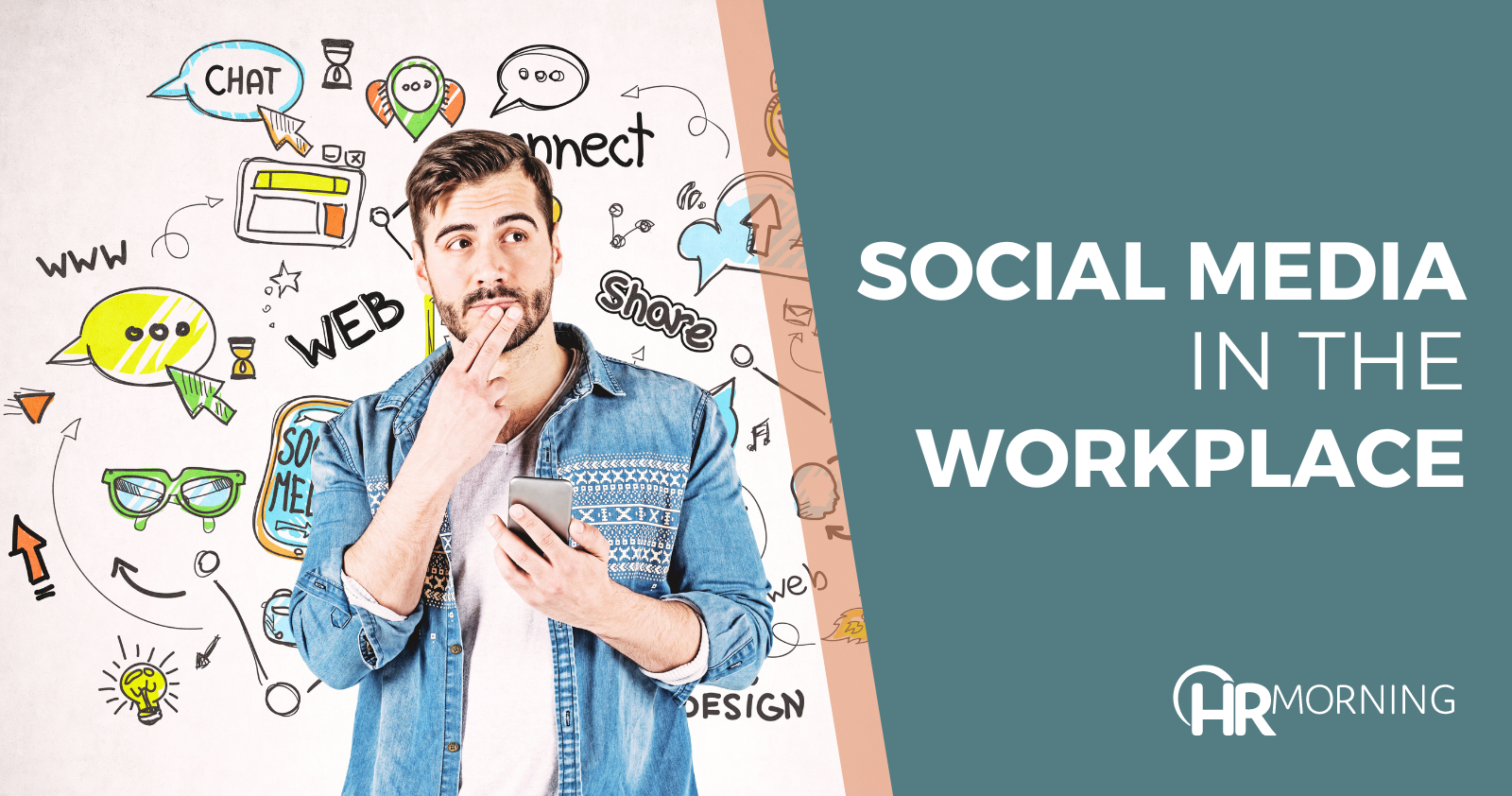There’s no denying the importance of social media in the modern age: In a post-pandemic world, it can help bring people together to build connection and community, even when they’re not face to face.
Social media in the workplace can be seen as an overt negative that distracts workers and keeps them from doing their best work. Although there are some drawbacks, social media in the workplace can have positive effects too, and HR needs to be able to create policies to balance out the positives and negatives of social media in the workplace.
To navigate the workplace in the social media age – and help decide what social media policies are right for your business – here’s everything you need to know about social media in the workplace.
How is social media used in the workplace?
Employers can use social media in the workplace to help the business financially or otherwise. Employers may use social media for a myriad of reasons, like:
- Promoting products or services
- Increasing brand recognition and awareness, and
- Recruiting candidates or clients.
Employees can also use it to help promote the brand or showcase company culture, leading to increased brand recognition.
According to the Pew Research Center, employees who use social media during the workday use it to:

Pros of social media usage
It’s unrealistic to outright ban employees from social media usage at work – and it may not be a good business decision, either. There are many benefits of using social media in the workplace that your company could miss out on. Here are some benefits of using social media in the workplace.
Supports employee recruitment
Social media can be a valuable recruitment tool. Whether you’re actively hiring or not, a consistent social media presence can help potential candidates get to know vital information like company culture, which is more important than ever.
Social media can also be an unlikely but valuable place to share job postings, especially on sites popular for job seekers like LinkedIn. It can even be a useful tool further down the recruiting pipeline to vet potential employees with any public social media profiles.
Plus, a company that builds out a solid social media profile can help encourage current employees to do the same. In turn, employee interaction can increase visibility and may even spur an increase in employee referrals.
Gives employees a mental break
It’s not reasonable to expect employees to sit and work with no breaks for eight hours, and studies show that it isn’t productive, either. Productive social media use can help employees break up the workday and provide a “reset” so they can come back and do their best work.
Plus, providing flexibility and promoting a healthy work-life balance through personal use of social media can help improve employee morale and make employees less likely to burn out.
Aids in employee engagement
In a remote and hybrid world, engagement can be tricky to navigate, but employers can use social media in the workplace to promote employee engagement. For example, employers can use social media to:
- Host an “Employee Spotlight” feature to highlight workers’ experience and hobbies
- Introduce new employees through social media posts, and
- Highlight big accomplishments, such as awards, certifications or major career developments.
It’s important to keep any employee-focused social posts positive, as employees will be more likely to interact with content that shows them or their peers in a good light.
Plus, a social media presence that engages employees can foster employee advocacy – where employees act as a spokesperson or advocate for the company – which can make them more likely to stay with the company.
Strengthens employer brand on social media
A positive social media presence will help strengthen your brand, which can lead to a whole host of benefits.
Strategic social media marketing can certainly help the business side of your company, but it can also help recruiting efforts by strengthening your company’s reputation.
In an increasingly competitive market, a strong social media presence can stand out. Here are a few best practices to elevate your social media marketing regardless of your budget:
- Take time to develop all parts of your social posts, from copy to graphics
- Track metrics that matter – like engagement – and understand that social media marketing metrics will be different from overall marketing metrics, and
- Try to get consistent engagement from employees to boost visibility.
Cons of social media in the workplace
Despite all of the pros, there are also some important cons of social media usage in the workplace that employers need to be aware of.
Can affect productivity during work hours
Small mental breaks during work hours can be the refresh that employees need to do their best work, but too much of a good thing can be a bad thing. Excessive social media usage can cut into employee productivity and affect your bottom line.
An employee who’s spending too much time on social media may let tasks fall through the cracks or miss deadlines. Often, it can be due to employees spending too much time on their personal social media accounts, and those with curated algorithms like TikTok can be especially easy to get lost in.
Consider that many spend upwards of three hours on social platforms per day, according to MixBloom.

Deciding when to intervene can be tricky; employers don’t want to create unnecessary conflict or be accusatory. But when employee productivity is being impacted, it may be time to have a conversation and take the appropriate intervention steps.
Creates security risks
Like any other online forum, social media can create security risks. Especially when employees are using personal social media at work, viruses and malware can infect work computers and create a security issue.
If a virus does get onto the computer, it can potentially expose sensitive information. It’s important to outline these potential risks and action steps and keep them aligned with your company’s social media policy.
Opens up the company to legal actions
No company wants to get caught up in legal issues. But the fact of the matter is that social media can open the company up to legal trouble since employers can’t fully control when and how often employees go on social media. Nor can they control what they post.
So, an employee who harasses others or posts negative sentiments about the company can be a huge legal threat to employers or cause a diminished brand reputation.
Case in point: Before a union election, a worker called his supervisor a “nasty mother——” on Facebook, and made other explicit statements against the supervisor. The post closed with “Vote YES for the union.” When he was fired, the worker filed an unfair labor practice charge and a federal appeals court upheld a determination that the employer violated the NLRA by retaliating against the worker for engaging in protected activity.
Whether or not an employer wins a lawsuit, legal issues due to social media can be costly, so it’s vital to ensure employees know what is and isn’t okay to post – and consequences, like potential disciplinary action, if they go rogue.
Creating a social media policy
So how do you balance the positives of social media with the potential drawbacks? Creating a social media policy in the workplace can be a valuable way for human resources pros to help set expectations for workers.
Social media isn’t going away anytime soon – in fact, it’s becoming a more integral part of our lives to connect and get information, so it’s important to have a detailed social media policy to protect yourself and your employees.
A solid social media policy should include:
- A point of contact for questions or concerns
- Definitions of major terms, like what is considered social media – for example, whether forums and blogs are included under the policy
- What is and isn’t allowed, both for company social accounts and personal use that involves the company – as well as disciplinary action if employees violate the policy, and
- A crisis plan for handling backlash on social media, security risks or legal issues.
Your social media policy may also want to explicitly mention productivity concerns, including how employees can ensure that social media usage is not cutting into productivity, such as specifying the amount of time employees should spend for mental breaks.
Takeaways for HR
Social media can be tricky to handle, but there’s no way to get around it: It’s a part of our lives and will impact the workplace. Creating a social media policy can help keep everyone on the same page and avoid costly mistakes.
By keeping the pros and cons of social media in mind, HR pros can help companies strike the right balance when it comes to social media at work.



